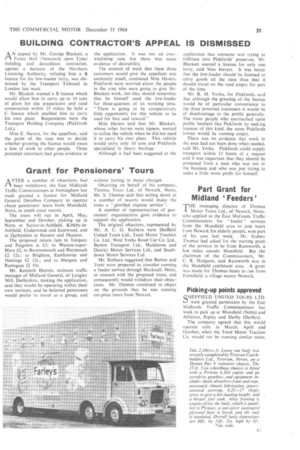BUILDING CONTRACTOR'S APPEAL IS DISMISSED
Page 35

If you've noticed an error in this article please click here to report it so we can fix it.
AN appeal by Mr. George Blackett, a Forest Hall (Newcastle upon Tyne) building and demolition . contractor, against a decision of the Northern Licensing Authority, refusing him a B licence for his low-loader lorry, was dismissed by the Transport Tribunal in London last week.
Mr. Blackett wanted a B licence which would allow him to carry up to 10 tons of plant for site preparation and road construction within 25 miles; he held a C licence which enabled him to carry his own plant. Respondents were the Transport Holding Company (Pickfords Ltd.).
Miss E. Havers, for the appellant, said the point of the case was to decide whether granting the licence would mean a loss of work to other people. Three potential customers had given evidence at the application. It was not an overwhelming case but there was some evidence of desirability.
The amount of work that these three customers would give the appellant was extremely small, continued Miss Havers. Pickfords were worried about the people in the area who were going to give Mr. Blackett work, but they should remember that he himself used the low-loader for three-quarters of its working time. "There is going to be comparatively little opportunity for this vehicle to be used for hire and reward."
Miss Havers said that Mr. Blackett, whose other lorries were tippers, wanted to utilize the vehicle when he did not need it to carry his own plant. This vehicle would carry only 10 tons and Pickfords specialized in heavy haulage.
Although it had been suggested at the
application that someone was trying to infiltrate into Pickfords' preserves, Mr. Blackett wanted a licence for only one lorry, said Miss Havers. It was better that the low-loader should be licensed to carry goods all the time than that it should travel on the road empty for part of the time.
Mr. H. M. Yorke, for Pickfords, said that although the granting of the licence would • bp of particular convenience to the three potential customers it would be of disadvantage to the public generally. [he more people who encroached upon public hauliers like Pickfords by seeking licences of this kind, the more Pickfords lorries would be running empty.
There was no evidence that work in the area had not been done when needed, said Mr. Yorke. Pickfords could supply transport within 12 hours of a request and it was important that they should be protected from a man who was not in the business and who was just trying to make a little more profit for himself.
















































































































